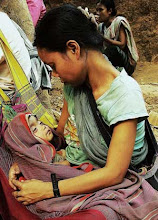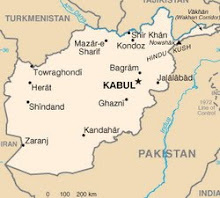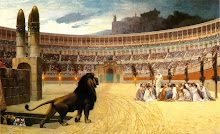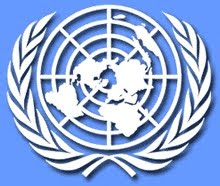 As I sit and write this article, I can hear automatic weapons firing. I cannot imagine the tragedy going on outside our compound at this very moment. Constantly, I have people asking me to help them escape to another nation. It is not pleasant to live in one of the most dangerous places on earth. Yet I know this is where my work is; this is where God has sent me and this is where I love to be, here in Baghdad, the capital of Iraq. Today is Sunday, so we had church this morning. As I led worship, I saw my congregation place their body armour, rifles and helmets aside and start to praise the living God.Yesterday I led my Iraqi congregation. I could not leave the international zone and go to church; evidently, too many people want to kill me, so I cannot leave the secure area. My congregation had to come to me. This took hours as they were all forced to go through an intense security process. Yet these Christians are the most wonderful people I have ever served. They worship our Lord with great intensity and joy! In the midst of their darkness and fear, Jesus is their joy. When you lose everything, you realise Jesus is all you have. In our Iraqi church, people no longer have food, water or homes. All they have must be provided by the church. Over two thousand Christians (who have been chased from their homes and threatened with death if they return) are now sleeping on church floors in Baghdad. Yet they continue to love Jesus. My work includes not just pastoring churches, but also dealing with religious sectarianism. In essence, I am a tentmaker. It is complex and difficult work. I do not always deal with very nice people. If you are trying to reduce violence, you can only do it by dealing with the people who cause it. Increasingly, these people are religious. In our context, they are Muslims—Shi’ia and Sunni—creating violence in God's name. When religion is at the heart of the cause of terror, you must use religion to deal with it.I am accepted because I am seen as being a religious figure and one who has been around for nearly a decade—years before the Iraq War began. In my work, I deal with people who are suffering a degree of loss. Although they all want to be given something back, we must first discern what has been lost—property, money, influence? Sadly, governments spend billions of dollars on weapons and military tactics and very little on the process of reconciliation.
As I sit and write this article, I can hear automatic weapons firing. I cannot imagine the tragedy going on outside our compound at this very moment. Constantly, I have people asking me to help them escape to another nation. It is not pleasant to live in one of the most dangerous places on earth. Yet I know this is where my work is; this is where God has sent me and this is where I love to be, here in Baghdad, the capital of Iraq. Today is Sunday, so we had church this morning. As I led worship, I saw my congregation place their body armour, rifles and helmets aside and start to praise the living God.Yesterday I led my Iraqi congregation. I could not leave the international zone and go to church; evidently, too many people want to kill me, so I cannot leave the secure area. My congregation had to come to me. This took hours as they were all forced to go through an intense security process. Yet these Christians are the most wonderful people I have ever served. They worship our Lord with great intensity and joy! In the midst of their darkness and fear, Jesus is their joy. When you lose everything, you realise Jesus is all you have. In our Iraqi church, people no longer have food, water or homes. All they have must be provided by the church. Over two thousand Christians (who have been chased from their homes and threatened with death if they return) are now sleeping on church floors in Baghdad. Yet they continue to love Jesus. My work includes not just pastoring churches, but also dealing with religious sectarianism. In essence, I am a tentmaker. It is complex and difficult work. I do not always deal with very nice people. If you are trying to reduce violence, you can only do it by dealing with the people who cause it. Increasingly, these people are religious. In our context, they are Muslims—Shi’ia and Sunni—creating violence in God's name. When religion is at the heart of the cause of terror, you must use religion to deal with it.I am accepted because I am seen as being a religious figure and one who has been around for nearly a decade—years before the Iraq War began. In my work, I deal with people who are suffering a degree of loss. Although they all want to be given something back, we must first discern what has been lost—property, money, influence? Sadly, governments spend billions of dollars on weapons and military tactics and very little on the process of reconciliation.Proclaiming the Gospel in Baghdad?
In the midst of this war and trauma, we have a gospel to proclaim, the good news of Jesus. The whole notion of evangelism must be treated totally and utterly different in this context. There is no preaching on the streets or encouraging your congregation to convert the masses. Such activity would result in certain death.Despite these restrictions, there is ample opportunity to show and share the good news of Jesus. The prime way is through love and prayer. I have seen people come to faith in Jesus. I have baptised people and then sought to find protection for them as the death threats grew. One little girl whose mother became a Christian started telling friends that every night her mother talked to Jesus. It was not long before they also were forced to flee. I have wept when people I have loved had come to faith and then been killed. Here it is a matter of life and death.Here, it really is a matter of taking up your cross and following Jesus. Shortly after the war began, a large number of missionaries came here. Fortunately, they have all left. It became far too dangerous for them. Very few of those who arrived understood the first thing about the context they were trying to minister in. When foreigners come to Iraq, they often have no understanding of this culture. Often they do not even know of the amazing history of Christianity and continually do things that endanger local Christians. Added to this, most of the foreigners and missionaries who came to Baghdad did not speak any Arabic. Their Christian translators were seriously put at risk; most have had to flee the country.It is important to remember that even what people say and do in their own countries and contexts can have serious consequences for Christians in Iraq. With mass media, what is said in the West can seriously effect what happens here. Radical liberalism may be safe in the West; however, here it simply kills people. Because of this, I have recently become more conservative in my speech. I love my people and they are suffering enough already. I want no further harm to come to them.
Coming Alongside the Church in Baghdad
Coming Alongside the Church in Baghdad
Despite the difficulties of serving Jesus in Baghdad, there are several things we, as God’s Church, must and can do.
1. Love Jesus taught us to love our enemies. Although it is not easy to love bad people, God can give us the grace to do it. Throughout my life I have listened to countless sermons, telling us we do not have to like our enemies—we just have to love them. Love is reduced to not pursuing the negative of hate.To this attitude I say nonsense! Love is real. It is difficult, it is costly and it changes lives because it enables people to see Jesus. In our context, it is not some liberal concept of evangelism without risks—even loving these people is taking great risks. Love does and has completely changed people. However, those doing the work of the gospel in the most traumatic of places cannot even talk about the true nature of their work for fear of their lives. Our Embassy here in Baghdad has had to send me home. In the past, I have said too much and the death threats have come in abundance. The truth around here is that we really need to deal with fear; however, perfect love does cast out all fear.
2. Pray We also need to seriously pray. I have a small group of intercessors who pray and intercede for us in our work. Although I cannot always tell them what is really happening, they often know because God tells them. There have been countless times when our intercessors have told me they have been praying about actual things that happened which I have not told them about. We should expect our Lord to work in supernatural ways when we are dealing with supernatural things.
3. Study Islam and Arabic Working in an Islamic culture means the need to study both Islam and Arabic. It is essential we know the context we are ministering in. It is necessary we understand how our faith is perceived in the Islamic faith and context. Among Muslims, I have often seen Jesus even more revered than in Christianity. In Islam, there is even the belief in the second coming of Jesus, so even before one starts talking about faith, there is a need to understand how our faith is seen by the other.
4. Seriously Support Local Christians It is very often the case that those who come to minister in this context have no idea about the local Christians. Here in Iraq, people have followed the God of Abraham, Isaac and Jacob for a very long time since a really miserable and reluctant evangelist named Jonah turned up by submarine transportation 2,700 years ago. He was followed seven hundred years later by another miserable person, doubting Thomas, who was on his way to India. He also stopped off in Nineveh and told the people that their Messiah had come one thousand miles down the road in Israel. They believed him, and to this day Nineveh is full of Christians. Many in my church in Baghdad believe in Jesus because of these two miserable people. They were the best evangelists ever. The Christians here in Iraq are wonderful and have an amazing history. At Christmas their evangelistic activity is to have a party for the locals where they show them love and give them food. Before the event, the Christians seriously pray for the event. If we really support and love the people here, we will provide them with food, water and money so they can continue to show love so that the gospel will be made known.
5. Expect Miracles In such trauma, we must rely on the miraculous more and more. When people are sick, ill and dying, we often have no doctors to take them to. They have either left or been killed. Jesus often comes and heals our sick people. Because of this, people of other faiths see we have a God of miracles and it is not long before they want to come to the Great Physician as well. They want something back in their loss and Jesus alone can give it to them. Even in the midst of this crisis, God is still real and full of love. When people see him, they are drawn to him. And as we continue to serve him, we love, pray, seek to understand our context and the local church and expect miracles.
By The Rev'd Cannon Andrew White1. Love Jesus taught us to love our enemies. Although it is not easy to love bad people, God can give us the grace to do it. Throughout my life I have listened to countless sermons, telling us we do not have to like our enemies—we just have to love them. Love is reduced to not pursuing the negative of hate.To this attitude I say nonsense! Love is real. It is difficult, it is costly and it changes lives because it enables people to see Jesus. In our context, it is not some liberal concept of evangelism without risks—even loving these people is taking great risks. Love does and has completely changed people. However, those doing the work of the gospel in the most traumatic of places cannot even talk about the true nature of their work for fear of their lives. Our Embassy here in Baghdad has had to send me home. In the past, I have said too much and the death threats have come in abundance. The truth around here is that we really need to deal with fear; however, perfect love does cast out all fear.
2. Pray We also need to seriously pray. I have a small group of intercessors who pray and intercede for us in our work. Although I cannot always tell them what is really happening, they often know because God tells them. There have been countless times when our intercessors have told me they have been praying about actual things that happened which I have not told them about. We should expect our Lord to work in supernatural ways when we are dealing with supernatural things.
3. Study Islam and Arabic Working in an Islamic culture means the need to study both Islam and Arabic. It is essential we know the context we are ministering in. It is necessary we understand how our faith is perceived in the Islamic faith and context. Among Muslims, I have often seen Jesus even more revered than in Christianity. In Islam, there is even the belief in the second coming of Jesus, so even before one starts talking about faith, there is a need to understand how our faith is seen by the other.
4. Seriously Support Local Christians It is very often the case that those who come to minister in this context have no idea about the local Christians. Here in Iraq, people have followed the God of Abraham, Isaac and Jacob for a very long time since a really miserable and reluctant evangelist named Jonah turned up by submarine transportation 2,700 years ago. He was followed seven hundred years later by another miserable person, doubting Thomas, who was on his way to India. He also stopped off in Nineveh and told the people that their Messiah had come one thousand miles down the road in Israel. They believed him, and to this day Nineveh is full of Christians. Many in my church in Baghdad believe in Jesus because of these two miserable people. They were the best evangelists ever. The Christians here in Iraq are wonderful and have an amazing history. At Christmas their evangelistic activity is to have a party for the locals where they show them love and give them food. Before the event, the Christians seriously pray for the event. If we really support and love the people here, we will provide them with food, water and money so they can continue to show love so that the gospel will be made known.
5. Expect Miracles In such trauma, we must rely on the miraculous more and more. When people are sick, ill and dying, we often have no doctors to take them to. They have either left or been killed. Jesus often comes and heals our sick people. Because of this, people of other faiths see we have a God of miracles and it is not long before they want to come to the Great Physician as well. They want something back in their loss and Jesus alone can give it to them. Even in the midst of this crisis, God is still real and full of love. When people see him, they are drawn to him. And as we continue to serve him, we love, pray, seek to understand our context and the local church and expect miracles.
As in the days of Noah.....

























.bmp)
No comments:
Post a Comment